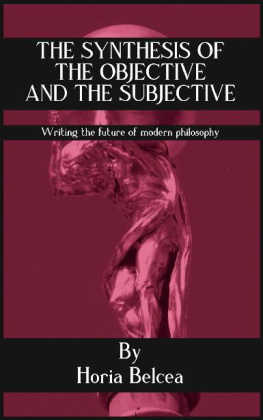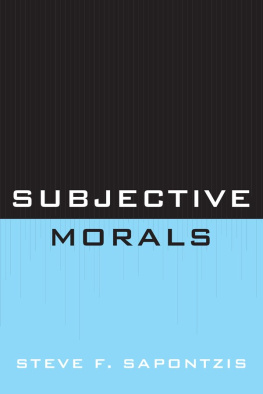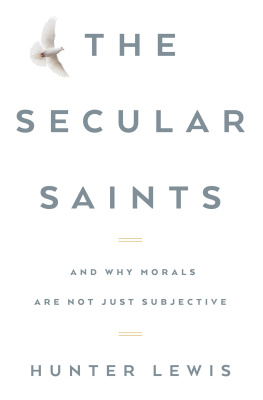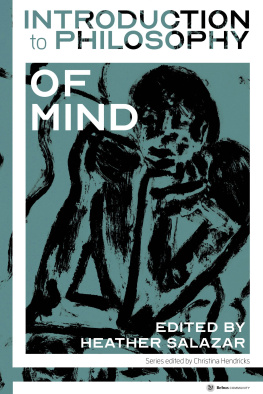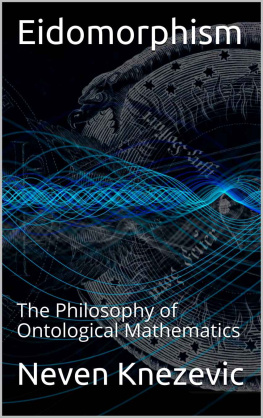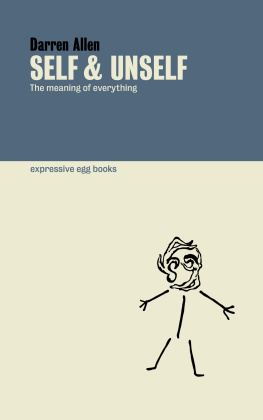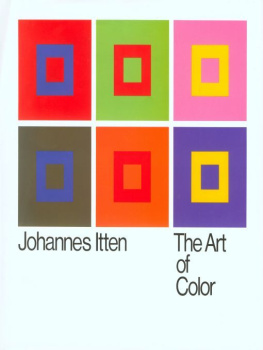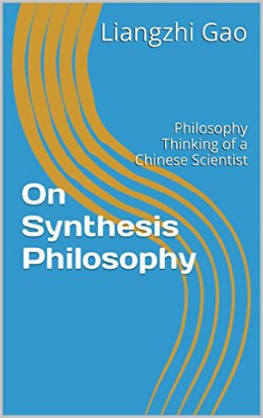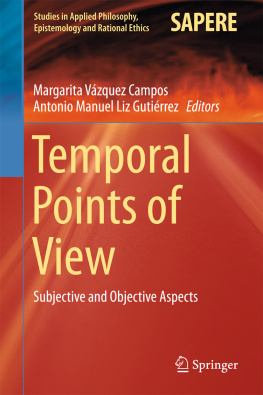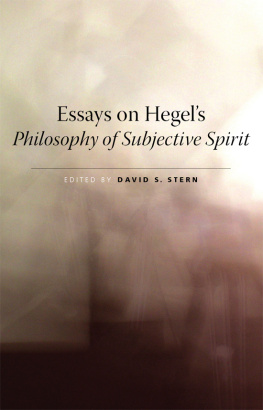Horia Belcea - The Synthesis of the Objective and the Subjective: Writing the future of modern philosophy
Here you can read online Horia Belcea - The Synthesis of the Objective and the Subjective: Writing the future of modern philosophy full text of the book (entire story) in english for free. Download pdf and epub, get meaning, cover and reviews about this ebook. year: 2020, genre: Religion. Description of the work, (preface) as well as reviews are available. Best literature library LitArk.com created for fans of good reading and offers a wide selection of genres:
Romance novel
Science fiction
Adventure
Detective
Science
History
Home and family
Prose
Art
Politics
Computer
Non-fiction
Religion
Business
Children
Humor
Choose a favorite category and find really read worthwhile books. Enjoy immersion in the world of imagination, feel the emotions of the characters or learn something new for yourself, make an fascinating discovery.
- Book:The Synthesis of the Objective and the Subjective: Writing the future of modern philosophy
- Author:
- Genre:
- Year:2020
- Rating:4 / 5
- Favourites:Add to favourites
- Your mark:
- 80
- 1
- 2
- 3
- 4
- 5
The Synthesis of the Objective and the Subjective: Writing the future of modern philosophy: summary, description and annotation
We offer to read an annotation, description, summary or preface (depends on what the author of the book "The Synthesis of the Objective and the Subjective: Writing the future of modern philosophy" wrote himself). If you haven't found the necessary information about the book — write in the comments, we will try to find it.
Horia Belcea: author's other books
Who wrote The Synthesis of the Objective and the Subjective: Writing the future of modern philosophy? Find out the surname, the name of the author of the book and a list of all author's works by series.
The Synthesis of the Objective and the Subjective: Writing the future of modern philosophy — read online for free the complete book (whole text) full work
Below is the text of the book, divided by pages. System saving the place of the last page read, allows you to conveniently read the book "The Synthesis of the Objective and the Subjective: Writing the future of modern philosophy" online for free, without having to search again every time where you left off. Put a bookmark, and you can go to the page where you finished reading at any time.
Font size:
Interval:
Bookmark:
The Synthesis of the Objective and the Subjective
Writing the future of modern philosophy
Horia Belcea
Contents
Preface
What kind of person buys philosophy books? I ask this question because I don't come from the world of literature or philosophy. I am, in many ways, a product of our times, and like many, I considered philosophy to be a superfluous subject of little practical use. Whether people are aware of it or not, we live in an era when every tradition has to be justified. It is nonetheless difficult for me to justify why anyone should read my book without sounding self-important. This book does not strive for mediocrity, or to repeat what others have said; it is a work of pure originality from beginning to end, the likes of which should delight the reader of philosophy.
I wrote this 400 page book because it was necessary. To make it more accessible, I made sure to divide the book into 150 small chapters covering every conceivable kind of topic. The book contains seven full years of my personal philosophizing, and, by the end of it, by early 2020, I had leapfrogged past anyone I knew. What distinguishes modern philosophy from other forms of philosophy is perhaps that modern philosophy tries to tackle the hardest problems of modernity and industrial civilization. My work is informed by the latest current events but also tries to go past them and to improve civilization, at least intellectually.
Perhaps to answer the question for what kind of person reads philosophy books, it is equally important to ask what kind of person writes philosophy books. Already on the first page, we are dealing with the topics of subjectivity and objectivity, and how they inter-relate. The ideas contained in this book were created by me, and you will learn more of my personality and style in chapter after chapter. It turns out that one of the greatest pleasures of reading is to connect with a real person. The quirkier and more unique the author happens to be, the more readers seem to appreciate him.
I am someone who never had any ambition to write anything for the public. What changed my attitude towards writing was that the ideas were too good to keep hidden any longer. The objective of this book is quite lofty; I would like to irrevocably change the mind of my reader and to present the future of civilization, to present a distant dream of what lays in front of us for the next 100 years. I am an accidental philosopher; to say anymore would spoil the story. I am also perhaps an accidental genius; that opinion is yours to accept or reject.
Introduction
As late as 2019, I did not know that I would be writing this book. What first emerged as a personal journal of my own ideas then became necessary to present to the wider world. There are many new observations and insights, but more than that I recognized in me an enduring need to organize my ideas in a system of thought. I always had an insistent belief that everything could be explained logically in the world; all spheres of life had to submit to an intellectual analysis.
The problem with most systems of thought is that they're terrible; I kn ow what social scientists are like. Somehow, I was always better at creating systems of thought than they were. Perhaps this is because I had an artistic side, and I did not struggle with my logical nature, nor did I feel the need to convince anyone that I was logical. I am also mostly untainted by academic thinking. There won't be a need to bring a whole glossary of definitions; my primary audience has always been the average person.
When it comes to intellectual life, I learned that the better you are at it, the less you look like an intellectual. I have no patience for someone describing an idea in two full pagesor ten pageswhen it could be explained in a single paragraph. When I first entertained the idea of becoming a writer, I considered it ridiculous because my mind did not like to linger on anything for too long. I became aware at some point that all my thoughts were short and to the point; I did not labor my ideas for too long or felt the need to explain them to anyone.
I mention all of this perhaps because I want to tell the reader that this book is not written in the typical academic style, or seeks to emulate other public intellectuals. Somehow, I never really fit into their way of looking at the world, and yet I was more ambitious than any of them. I largely use a vocabulary that anybody could understand, but I aim at attaining scientific rigor in explaining the world.
The world is a strange place in a way; I learned over the years that mainstream culture is unbelievably narrow in what types of stories make it to the public consciousness. Most books represent some agenda; they represent an ideology, or an institution, or a call to action. This book doesn't do any of that. This book lays the foundations for the future. The future is rarely given a place on the front pages before it is successful. If you're reading this book, consider yourself lucky.
The chronological journalistic style of the book also lends itself well for quickly covering many diverse subjects. I think that makes the book more honest and concordant with my own thought patterns and journaling experience. Some chapters might be obsolete by the time we get to the end of the book, but I did make an effort to highlight only chapters that contain earlier truths which never get replaced by subsequent knowledge. If you are stuck on some concept, keep reading.
My journal over the time period is many times larger than this actual book. I made the conscious choice to remove as much unnecessary content as possible, and it is unfortunate because the texts no longer fully capture the actual experience of coming up with new ideas. The experience was a lot more haphazard, and at times I had no confidence that I would ever progress further. Still, I preferred to write the shortest book that I could, packed with as much knowledge as possible, rather than spend many more months or years editing a thick tome of self-conscious ramblings. The book is, all things considered, short for how much knowledge is contained inside, and if you have trouble with any of the concepts, I recommend that you re-read it a couple of times or move on.
The grammar and syntax are self-edited; at times there are omitted errors, but it is supposed to reflect how I think and talk; the final copy is meant to get as close as possible to the thought process that I went through. I am well aware that my grammar might violate the laws of the English language in some areas, and I don't care. This book seeks to impart to the reader a general sense of what it's like to be present with my thoughts. I tend to think in less than a full sentence. I think in words, repeated words that ping inside my mind like an alarm; I tend to have anything but a linear intelligence. When an idea comes to me, it crystallizes lightning fast; some words are slow, meaningless, while other words are part of a wider arrangement. A single sentence must be read at different speeds; there is no regular cadence, only an attempt at simulating the many different lanes of speed inside my mind.
Next pageFont size:
Interval:
Bookmark:
Similar books «The Synthesis of the Objective and the Subjective: Writing the future of modern philosophy»
Look at similar books to The Synthesis of the Objective and the Subjective: Writing the future of modern philosophy. We have selected literature similar in name and meaning in the hope of providing readers with more options to find new, interesting, not yet read works.
Discussion, reviews of the book The Synthesis of the Objective and the Subjective: Writing the future of modern philosophy and just readers' own opinions. Leave your comments, write what you think about the work, its meaning or the main characters. Specify what exactly you liked and what you didn't like, and why you think so.

